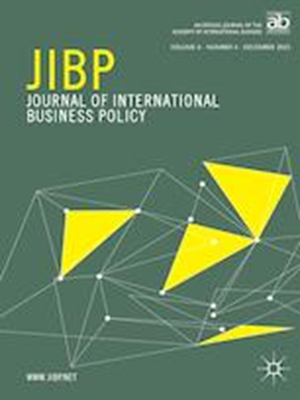产业政策环境与非洲跨国企业的蓬勃发展
IF 4.4
Q1 BUSINESS
引用次数: 1
摘要
对非洲组织的研究主要集中在环境因素对组织有效性的影响上。然而,越来越多的人关注非洲的挑战,以及它们如何对组织成果产生负面影响,因此有必要利用组织学术的“积极转变”来推进产业政策如何使非洲起源的跨国企业(a- mnes)蓬勃发展的观点。我们提出了一个多层次的模型,在该模型中,由机构和政策发展组成的产业政策环境积极影响跨国公司繁荣,这是一个综合指数,包括人类、环境和经济繁荣。这种关系受产业政策——劳动力、贸易、基础设施和资源——的调节,并受政策的适宜性、相关性和及时性的调节。总的来说,我们将以组织有效性为代表的组织成果的旧范式转变为以组织繁荣为代表的新范式。这种新模式似乎更适合非洲,因为非洲正受到各种限制有效性的不寻常挑战的困扰。我们讨论了模型的实证检验和对管理者的启示。本文章由计算机程序翻译,如有差异,请以英文原文为准。
Industrial policy environments and the flourishing of African multinational enterprises
Abstract Research on African organizations has focused on the influence of environmental factors in organizational effectiveness. However, increasing concerns about challenges in Africa and how they negatively affect organizational outcomes have necessitated leveraging the “positive turn” of organizational scholarship to advance a perspective of how industrial policies can permit Africa-originated multinational enterprises (A-MNEs) to flourish. We propose a multilevel model in which the industrial policy environment comprised of agency and policy development positively impacts A-MNE flourishing, a composite index of human, environmental, and economic flourishing. This relationship is mediated by industrial policies – labor, trade, infrastructure, and resources – and moderated by policy fit, relevance, and timeliness. Overall, we shift the old paradigm of organizational outcomes represented by organizational effectiveness to a new paradigm represented by organizational flourishing. This new paradigm seems more appropriate for Africa, which is bedeviled by unusual challenges that limit effectiveness. We discuss empirical testing of the model and implications for managers.
求助全文
通过发布文献求助,成功后即可免费获取论文全文。
去求助
来源期刊

Journal of International Business Policy
BUSINESS-
CiteScore
10.10
自引率
8.90%
发文量
18
期刊介绍:
The Journal of International Business Policy (JIBP) is a scholarly publication that aims to be the world's leading platform for research on international business policy. It seeks to showcase the best work from scholars in the field of international business and related disciplines. Additionally, the journal provides policy professionals with valuable insights for developing impactful policies.
JIBP is the official publication of the Academy of International Business (AIB), a renowned community of scholars in international business. The journal holds a prestigious status and is currently abstracted and indexed in various databases and platforms, including CNKI, Dimensions, EBSCO Discovery Service, Emerging Sources Citation Index, Google Scholar, Institute of Scientific and Technical Information of China, Naver, Norwegian Register for Scientific Journals and Series, OCLC WorldCat Discovery Service, ProQuest-ExLibris Primo, ProQuest-ExLibris Summon, Research Papers in Economics (RePEc), SCOPUS, and TD Net Discovery Service.
 求助内容:
求助内容: 应助结果提醒方式:
应助结果提醒方式:


